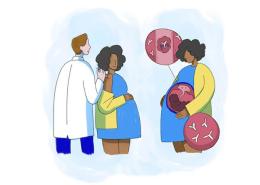Clinical Trials for Children – Why Are They So Important?

When doctors prescribe a medication, they may rely on the drug label (or US prescribing information) to help them understand how to use it safely and successfully. This prescribing information document comes along with a prescription medication and provides detailed information which comes directly from research studies and clinical trials:
- How the medication works in the body
- What specifically the medication has been approved to treat in the US (e.g., high blood pressure, high cholesterol, diabetes)
- What dose to prescribe of the medication and how it should be used by the patient
- What things to monitor before, during and after treatment
- What adverse events the medication may be associated with
In the past, children were not often included in clinical studies, and there is still much to be learned about how children are affected by medicines. In fact, only about 50-60% of prescription medicines used to treat children still have been studied in children, and almost no prescription medicines used to treat neonates have been studied in neonates. And yet, because children of all ages have illnesses that warrant treatment, doctors often need to prescribe medicines that have not been studied in them.
“Off-Label” Prescribing
Most medicines prescribed to children have not been tested in children. So, when doctors prescribe those treatments for kids, they do so in a way that’s called “off label.” This means that the drug has not been FDA-approved for use in children. It also means the doctor is making a clinical judgment on how to best use the medicine and in particular which dose is most appropriate in children, usually by reviewing scientific information based on studies with very small numbers of young patients, case reports, or anecdotal accounts.
Children Are Not Smaller Versions of Adults
So why have clinical trials in the past rarely included pediatric patients? In part this is because science long ago treated children as merely a smaller version of adults. Children were expected to react similarly to grown-ups when given the same therapies that may have been prescribed at a lower dose or frequency, simply based on weight or height.
But children and infants are always growing—not just height, weight, but also their brain, internal organs, nervous system, and even metabolic processes—which creates physical differences from adults. For example, did you know that children have thinner skin and a higher heart and respiratory rate than adults? A child with the same disease as an adult may even have different symptoms and disease effects. Additionally, children’s organs and metabolism are constantly changing, which can affect the way a medication is processed in their bodies.
Growing Opportunities to Participate
Recent laws require clinical trials for certain medical therapies for children.This means that there are many more opportunities for children to participate in a much wider range of pediatric clinical trials. Researchers are studying new drugs, vaccines, devices and procedures, as well as new ways to more safely prescribe in children the treatments that have been around for a while. It is expected that with new trials, much will be learned about diseases and common conditions in children and how they respond to medications in different age groups.
To Enroll or Not To Enroll Your Child
At the Healthy Children Conference & Expo in March 2014, hosted by the American Academy of Pediatrics, surveys given to parents with children who may be eligible to participate in trials found that there were several reasons why parents would find it difficult to have their child participate in clinical research. The most common reasons were:
- Time
- Other obligations (e.g., sports, school)
- Might be scary or painful
- Could get sicker or develop side effects
The reasons parents indicated they may enroll their children in clinical research were equally important. Common ones included the following:
- Give doctors and researchers a kid’s point of view
- May help other children or people
- May save lives
- Makes children feel good about themselves
- Teaches children about research
- Teaches children about healthcare
Learn More
Joining a clinical trial for any reason is a big decision for you and your child. It is important to weigh the risks and benefits. If you and your child are interested in a clinical trial—or have been asked to join one—speak with your doctor, call the study center, and get all the facts. This is how you can start to make an informed decision about participating.
Charles A. Thompson, MD, FAAP, is the Global Lead for the Pfizer Pediatric Center of Excellence and the Chair of the American Academy of Pediatrics Section on Advances in Therapeutics and Technology. Dr. Thompson is a Clinical Instructor of Pediatrics at the University of Connecticut School of Medicine, a member of the medical staff at Connecticut Children’s Medical Center, and a Board Member for the Hezekiah Beardsley Connecticut Chapter of the American Academy of Pediatrics.
Edress Darsey, PharmD, is a Global Medical Director in Pfizer’s Pediatric Center of Excellence. After 10 years of clinical practice in a large Children’s Hospital, Edress joined Pfizer and has worked in medical affairs until joining the Pediatric Center in January 2014.





